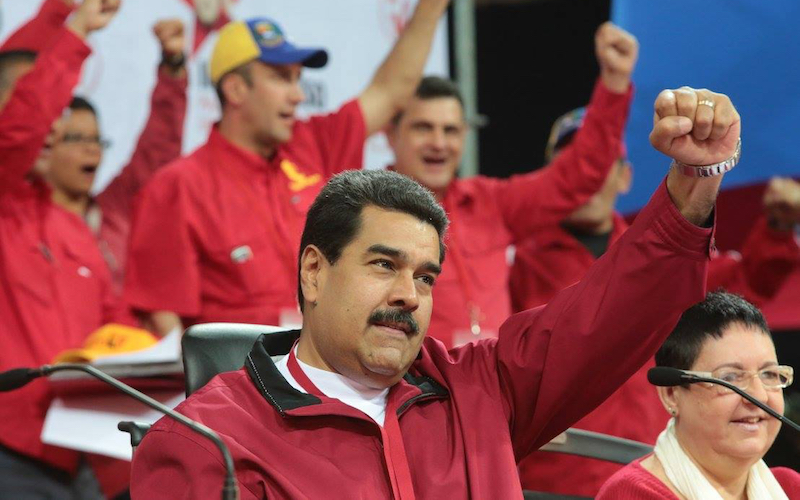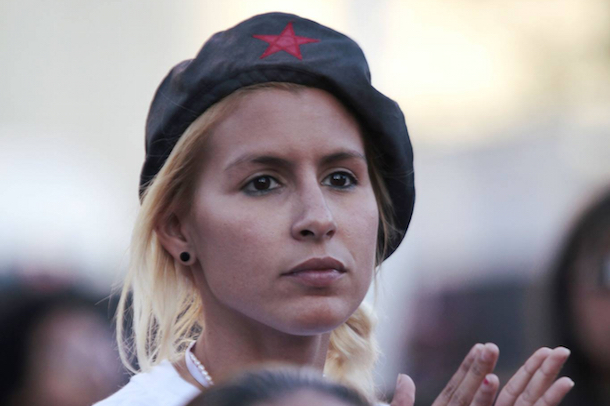
Venezuela: How Maduro Remains in Power
If one is to believe the pundits it looks impossible that the Chavismo government in Venezuela will not remain in power. Waiting in line for hours to buy basic goods is testing the Venezuelan people’s patience. Despite the predictions for a swan song for the Chavismo government, Maduro seems to be securely in power and will most likely finish his regular term until the next presidential elections in 2019. It is a given that the government of Maduro has pursued flawed economic policies. The creation of an alternative industry, other than the oil sector, is very difficult for a rentier state like Venezuela, since it is just cheaper and easier to live on the oil revenues and import most consumer goods – as long as there is no dramatic drop in oil prices.
In Venezuela a restrictive currency exchange system promotes a flourishing black market which has resulted in exorbitant inflation of over 60 percent last year leading the government to in turn introduce fixed prices for basic goods and forcing companies to sell products at a loss. The Venezuelan government successfully distracts public opinion from its own incompetence by blaming others for the pressing economic difficulties like the “oligarchs” – the Venezuelan opposition and business elites – who would overthrow the government of Maduro for political motives by sabotaging the Venezuelan economy.
This works well because such allegations are not plucked out of thin air: After the failed coup attempt against Chávez in 2002 a broad coalition of oppositional forces tried to oust Chávez with a general strike and acts of sabotage paralyzing the Venezuelan economy. Blame is also passed on to the global capitalist neoliberal system led by the US.
Blamed are global financial institutions and rating agencies which give bad credit ratings to Venezuela out of ideological and political motives so that Venezuela cannot secure more or only very expensive loans. Consequently, Maduro is able to make use of the economic impasse by evoking “rally around the flag” thus uniting his adherents in the fight against “international capitalism” for the Bolivarian Revolution.
Another debilitating factor for Maduro should be the strong and professional Venezuelan opposition. A clear sign of oppositional power is the government’s use of force – even though oppositional protesters are also prone to violence – to maintain the upper hand. Yet, despite large-scale campaigns the opposition is still perceived as elitist among the broader population. In addition to that, it has no common vision for the country beyond uniting anti-Chavismo elements. The broad oppositional party coalition “Mesa de la Unidad” consisting of almost 30 parties indulges in internal rivalries.

Nonetheless, twice presidential candidate Henrique Capriles Radonski tries to chart an inclusive course to overcome the political polarization in the country. He distances himself from the more radical approach of María Corina Machado, Leopoldo López and Antonio Ledezma, who headed the “La Salida”- protest of February last year, which led to violent actions by the government as well as some protesters. They promote radical enmity against the government and thus further ignite political polarization. Machado was deprived of her mandate as a member of parliament. López has been detained for over a year as leader of last year’s protests and Ledezma was arrested this February for conspiring against the government. Together with Machado and López, he had called for a “National Transition Agreement” which was not signed by Capriles. But what would such a transition look like, when Maduro is the legitimate president of the country? Such actions by the opposition strengthen the image of being an elitist enemy planning a coup against the Venezuelan people.
The last factor is the US, whose stance towards Venezuela turned negative with the election of Hugo Chávez in 1998 after years of friendship. Since then, the US has applied exactly the kind of policy that enables Maduro to engage in rants against the imperial enemy. Obama’s executive order of 9 March implementing sanctions against seven Venezuelans which cast the situation in Venezuela as an “unusual and extraordinary threat to the national security and foreign policy of the United States” helped Maduro foster unity and support not only within his country, but throughout Latin America.
The sanctions appear to be a clear miscalculation. The policy change towards Cuba could have led to a similar political thaw with Cuba’s ideological ally Venezuela. However, leaving aside the idea of a fundamental policy change of the US in Latin America, the executive order can be understood as a trade off to the Republican majority in the US Congress for the opening to Cuba. This policy, however, plays right into the hands of Maduro and allows him to promote an imperialist narrative of US-policies which is shared by other Latin American countries.
The question arises as to how a legitimate change of government could possibly occur prior to presidential elections in 2019 since overthrowing the legitimate government would simply qualify as a coup d’état. Since the radical oppositional course will apparently not be successful, the opposition would be better off with a moderate and inclusive approach recognizing the social achievements of Chavismo. Even if the opposition succeeded in the parliamentary elections later this year, it would be only a weakening and not the end of Chavismo; in fact it would just mean a divided government similar to the US. Beyond that, the opposition can initiate a recall referendum against Maduro after he has completed half of his term in 2016. This however kindles negative associations since such a referendum has already failed before in 2004 against Chávez. Change for the better will only be possible with Chavismo not without it and certainly not against it.

